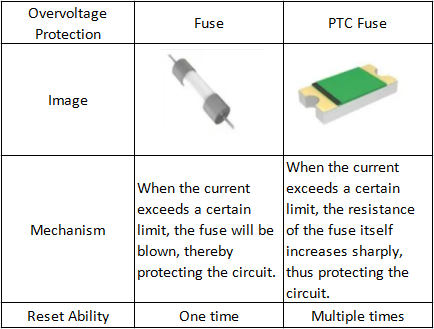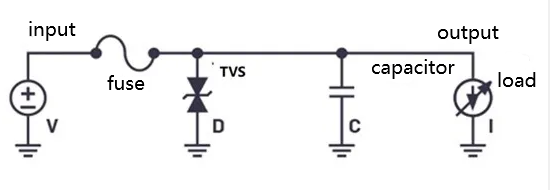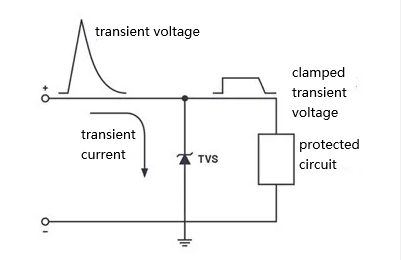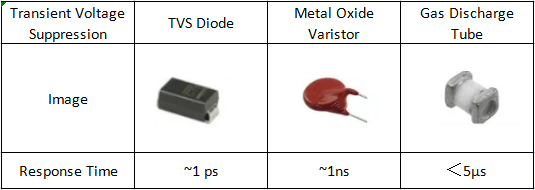Circuit Protection – Passive Components
In a classic circuit protection scheme, passive components (such as fuses, transient voltage suppression diode, etc.) are used for circuit protection.
The following figure is a schematic diagram of a typical circuit protection scheme:
When the input voltage is too high, a transient voltage suppression component, such as a transient voltage suppression diode (TVS), can be used to conduct excess energy to ground. When the current is too large, the fuse can be connected in series, and the excessive current will blow the fuse to protect the circuit.
Transient Voltage Suppression Components
They have certain differences in structure and characteristics, but they all work in a similar way: when the voltage exceeds the device threshold, the excess current is shunted.
The Working Principle of TVS:
When an overvoltage condition occurs at the input, the TVS turns on and protects the circuit from the danger of overvoltage by shunting excess energy to ground (GND).
The response time of different transient voltage suppression components is shown in the figure below:
- Transient Suppression Diodes (TVS)
- Metal Oxide Varistor (MOV)
- Gas Discharge Tube (GDT)
Although TVS devices are effective at suppressing very high voltage excursions, they are not immune to damage when faced with sustained overvoltage events, thus requiring periodic monitoring or replacement of the device. Whereas a GDT may have a response time of a few microseconds but can handle larger surges.
Overcurrent Protection: Fuse
The series fuse, when the circuit current is too large, will be blown to protect the circuit. At the same time, it also brings the problem of maintenance and replacement. A resettable fuse (PTC) is also available to reduce maintenance requirements.
A resettable fuse can be regarded as a resistor with a positive temperature coefficient. The greater the current, the greater the self-heating, resulting in a sharp increase in its own resistance, thereby achieving the effect of suppressing the current.

Fuse Blowing Time
The response time of the fuse is not the faster the better. For example, in some motor applications, the starting current may be very large, resulting in misoperation during the starting phase and burning out the fuse. Also, when replacing the fuse, it is necessary to pay attention that the response time of the replacement fuse should be the same as that of the previously used fuse, otherwise there may be unexpected risks.
Summary
Of course, there are more than several passive protection devices, and diodes can also be used to deal with the problem of reverse polarity connection, or a filter composed of capacitors and inductors can be used to solve small transient current. Only by understanding the various potential dangers in the project, and then according to the specific requirements of the project, prescribing the right medicine and choosing the appropriate circuit protection scheme reasonably, can we get twice the result with half the effort.
This article is provided by JYH HSU Electronics, an original manufacturer of electronic components such as capacitors and resistors.
Post time: Jul-31-2023



